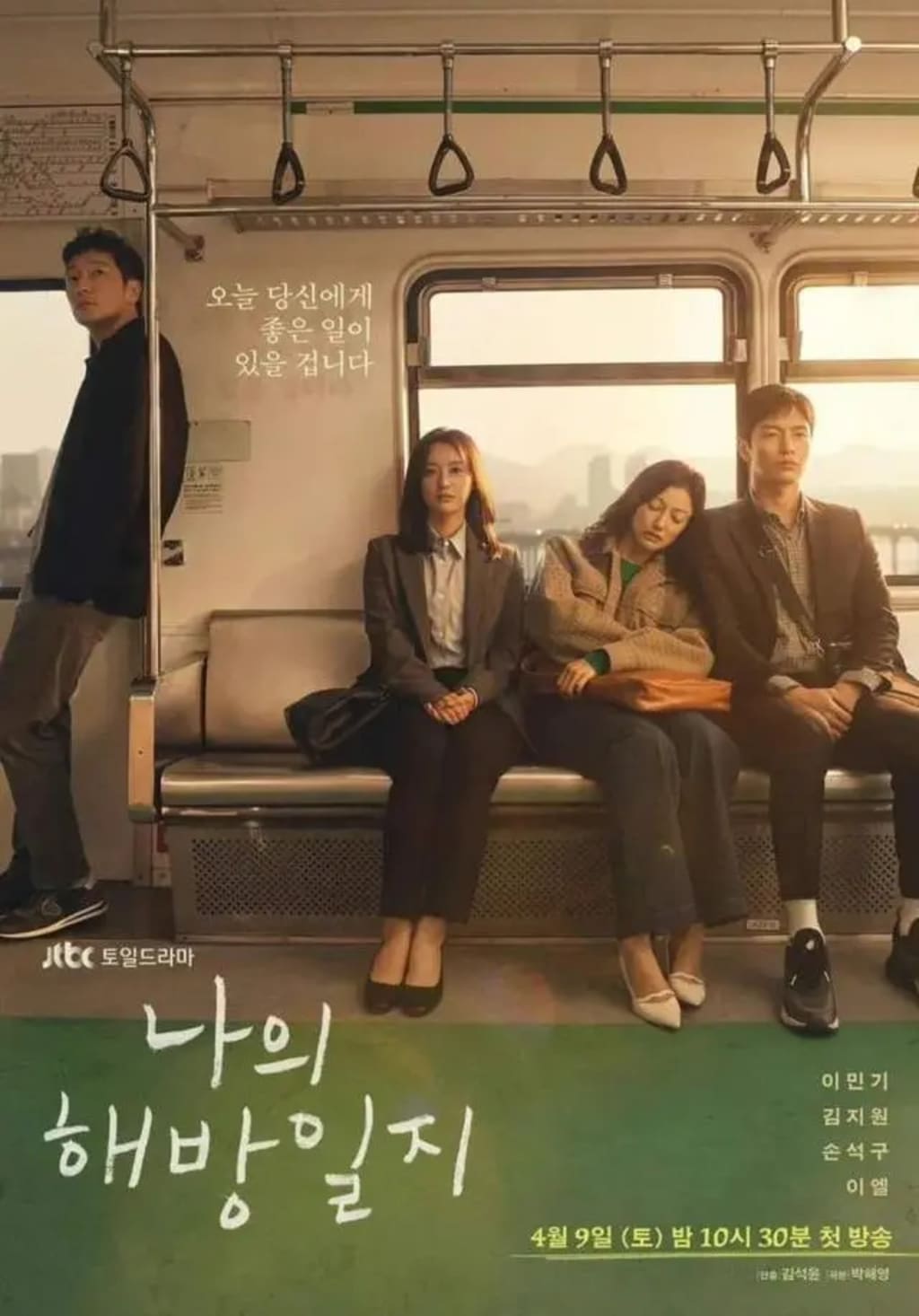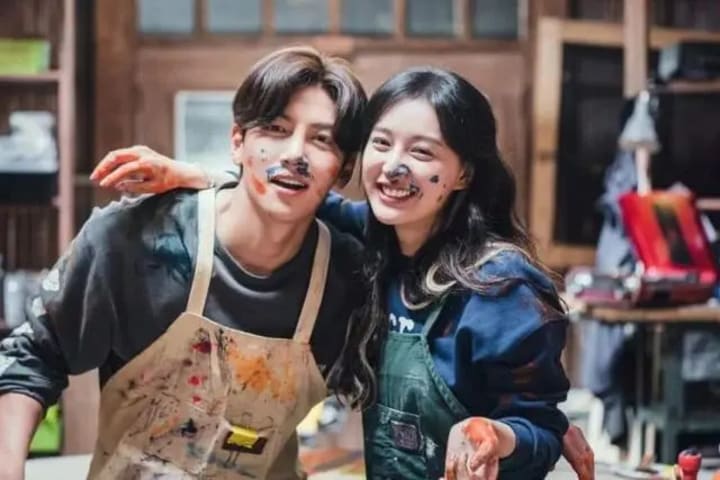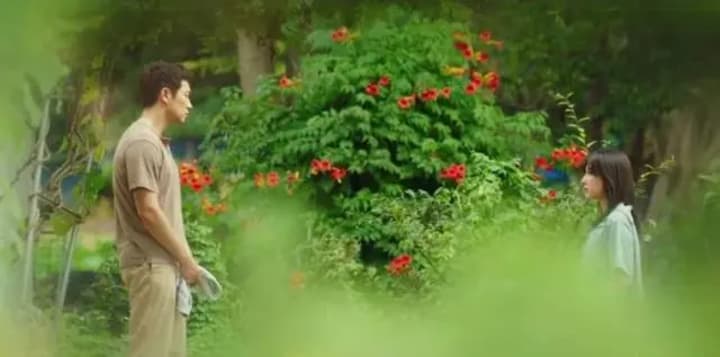
Recently, I have been looking for some dramas that talk about common social animals and social terrorism, but they are not very interesting.
I wanted to find some empathy, but the domestic drama, those who just graduated to live in a large bungalow, repeatedly make mistakes, but also by the domineering president to open the "golden finger", all the way to upgrade and fight; or the family has a mine, the graduation of the president of the drama, it is really to see me sigh, do not want to be so ordinary ah, these characters.
Some time ago I noticed the new Korean drama "My Runaway Diary" and thought the title was interesting, meaning "release yourself, don't trap yourself and forget to find happiness".
It focuses on a few ordinary people who need to be "released".
I was surprised when I didn't finish watching the first episode. The writers know that ordinary people don't have the aura of a protagonist.
So Kim Ji-won's role as Corinne, a socially frightened girl, is empathetic. She is common enough to be precise and painful enough as if she has torn apart the realities of thousands of girls and brought them to the screen without reservation.
Corinne's home is far from Seoul, her daily commute takes three hours, she works as an ordinary employee in a large company, and she is crammed into the swaying and dreary subway every day.
Although there are no major illnesses or disasters, and her life is not uneventful, "unhappiness" still encroaches on her world, draining away her vitality, and she doesn't even know where the problem lies.
The history of literature has also depicted such people, such as the "zero remainders" who are often caught in internal struggles, eager to express and be recognized, but their weak and contradictory natures are like the strings of a kite, pulling them to a farther river.
She was so afraid that she could not easily muster the courage to try to talk to her colleagues, because of the long-term restraint, the conversation is always slow, it is difficult to integrate into the topic also seems to be boring, and finally, the effort is not pleasing, a few words left awkward.
Sometimes Corinne tries to give a good answer to a seemingly concerned inquiry, but people are just being polite, not wanting to know the answer.
For her, all the time she spends with her eyes open is labor, and everything is an internal drain. Since she gets no attention and no response, it is better not to try. And these thoughts, in her case, are persistent and long-lasting.
Corinne's inwardness is externalized to her eyes, which are so empty and wandering that if you fall into her eyes, it will be a bottomless panic.
The "quiet and well-behaved, moderate" after high school graduation, is no longer a 100% advantage, but these qualities are like an invisible lock, solidly on her body.
She likes, or is used to wearing plain clothes, and is content to finish her work day in and day out, without desire or interest.
In the eyes of her colleagues, she is a "good-looking, but too mediocre" girl, and even if she is pulled into the limelight, will not reflect each other.
I was impressed by the thunderstorm in the fourth episode, which blasted impatiently outside the office building window, compared to colleagues who were scared of thunderstorms, and Mi-Jeong, who liked thunderstorms, said "there is a kind of peace that the world is going to end.
When the thunderstorm did not stop after returning home, the village was blacked out by loud thunder, and Mi-Jeong was worried about the hero who was still out drinking, so she rushed out to "rescue" him, and then went home at a brisk pace as if she had finished releasing herself.

Corinne seems to be full of the points in the social elimination mechanism: the family is not as good as others, skill is not as good as others, and character is not as good as others.
I saw a lot of viewers who could not empathize with Mi-Jeong during the drama, and they pounded out "pretentiousness and overthinking" to the pop-ups, suggesting that "she can try to change and have fun".
The problem is tCorinnesorinne has lost the ability to perceive these pleasures, and the mediocrity is never about their looks, but about the locks, they can't unlock.
Corinne's parents, who have spent most of their lives working as farmers in small places, have no way of understanding the weariness that comes with a sore back, let alone the sighs of their children when they come home from the office every day, and the money and time they spend trying to please their looks and colleagues.
But Corinne people are sensitive, painful, and never without a reason.
A while ago I saw the news that 91% of respondents consider themselves to have psychological problems, and the most important reasons analyzed in it are similar to Mei-Chen's state.
Most ordinary people not only have to bear the pressure of life and work but also have to fight against the emptiness and heavy sense of meaninglessness and the endless internal volume and internal consumption.
Corinne's ability often just arrived at the average level, with no outstanding skills, most of us are also in this position, and mediocrity is not complemented and not to be criticized, so get used to not being noticed.
Not good at it will also be behind. Like in swimming class, Corinne hadn't learned freestyle yet, but her classmates already knew it, so the teacher went on to teach backstroke and breaststroke. In math class, she was still memorizing the 9-9 multiplication table, but her classmates had already learned fractions.
We too have taken many steps that we wanted to catch up with but couldn't, right?
Growing up in an environment devoid of love and care, Mi-Jeong was fated to suffer from "misanthropy" and wanted to be "released", as did other ordinary people who shared a sense of loneliness and value.
So this kind of drama is very rare to analyze ordinary life thoroughly, it does not just throw out the fragmentation of ordinary people and that's it, it wants us to look at the powerlessness, throw people into a piece and see what can collide to break the situation.
We see Corinne, her ship is sinking, but did not forget to leave the last straw for herself, and is resilient enough.
The world-weary exterior just nourishes Corinne's delicate and rich interior. Even if she is reticent, she can still try her best to perceive the world, even though the feedback she gets from the world is always not light enough, she still tries her best to find the small blessings in life.
For example, if she sees a billboard on her commute saying "something good will happen today", she will unconsciously smile and a hot stream will flow through her heart.
It is difficult to make friends with others, then talk to yourself more, and create another world for yourself, where she is not flawed and can express herself, be loved and recognized as others do, freely.
This is the same meaning as our usual self-enlightenment. We need some artificial sugar coating to digest those emotions and get through the repetitive days.
The huge debt left by her ex caught Corinne off guard. She doesn't give up on saving herself, and says to the equally unfortunate hero with a bit of command "I want to be filled with someone once, love alone is not enough, worship me." She believes that "in the spring, we will all be transformed".
The seemingly lame and broken words have worked. They turned over the dusty desire to share, to try to communicate, to share the things they met, and the billboard of "Good things will happen today" was no longer for Mi-Jeong to see alone.
I think maybe sometimes we can be like Corinne and not ask ourselves to be so decent, but we can also crash out of life.
My Diary of a Runaway" is currently in its sixth episode, and the people in it are still fighting against nothingness. This is the biggest point as if they are somehow connected to them, and we are waiting for the spring of "transformation" to come.
I like the fact that Kim Ji-won has played a few ordinary people, but Mi-Jeong is still different.
She has no background, no education, a job as a receptionist in a department store, and a dream to be a decent anchorwoman.
But she always had the energy and was lucky. Driven by her ambition, she knows clearly what she wants to do, and her good friends are always around her, and she has met a rich boy and finally HE with her childhood friend.
The Road to the Third Stream

Lee Eun-oh of "The Law of Love for Urban Men and Women" is plain, has low self-esteem is restrained, and usually speaks in a soft voice.
She was abandoned by her boyfriend and failed in the job application, but all the misfortunes were still disillusioned by her courage, she went to a strange place to start again with another identity, fell in love with the male lead, and carried out a romantic story, she broke through and returned to the original place Lee Eun-oh achieved metamorphosis.
The Law of Love for Urban Men and Women
In comparison, Ae Ra and Eun Oh's path is clearer, while Mi Jung is swimming hard but can't see the shoreline of powerlessness, which is why I want to give her more preference.
I think it is because I can empathize with her toughness that is deep in the mud but still longing for release and spring and the real life that is held by countless small fortunes.
Perhaps the back of suffering is not absolute happiness, but in the ordinary days without miracles, we always keep straws for ourselves, enough to support ourselves to meet another spring.
About the Creator
W man
Beggars cannot be choosers.






Comments
There are no comments for this story
Be the first to respond and start the conversation.